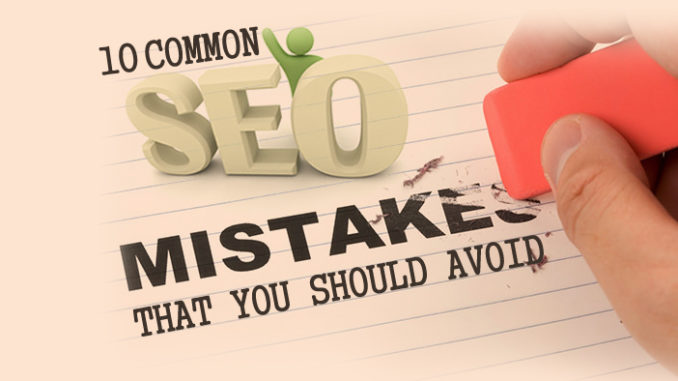
12 May 10 Common SEO Mistakes You Should Avoid
Optimizing your website is an essential element of your content marketing strategy. While SEO is changing, it stays on top of marketers’ agendas as it is a powerful way to bring visitors to your company’s outlets and to direct them towards your sales funnel.
SEO methods are constantly evolving due to search engines’ developments and users’ changing perspectives. It is not that easy to stay on top of the most successful optimization techniques, with many businesses falling into the trap of incorrectly doing SEO. Instead of seeing massive traffic and increasing conversion rates, the results can be quite the opposite.
There are some common SEO mistakes that are tough to avoid. Testing optimization approaches is also difficult because you can’t verify your methods in real-time since search engines’ rules are becoming hard to predict.
While the optimization field is ever-evolving, some practices are proving effective, while others are harmful in the long run. Let’s review the top 10 common SEO mistakes you should avoid so your business’ website will bring the desired results to match your efforts.
1. Not doing Home Page Optimization and Collection Pages Optimization
We recommend adding the SEO Content Blocks or tabs to your site with very target Keyword specific H2s, and content blocks. We recommend adding over 1500 to 2500 words over 100% unique content that is not stuffed and is very helpful content for your readers and for Google.
Adding an introduction paragraph to the top of your collections, but then adding a content slider to the bottom of the collection page below the products will also benefit your website.
To do all these and to fix the Shopify SEO problems in most Shopify sites, you can use this SEO Blocks app that directly fixes these main SEO issues of Shopify. This is a must have plugin for every Shopify site to overcome the SEO challenges and show Google you are a leading website in your industry and it should rank you over your competitors.
2. Choosing the Wrong Keywords
Optimizing is all about the keywords that you want your website to rank for. But are you choosing the right ones?
One of the most common mistakes in selecting keywords is neglecting the preference of search engines and users for long-tail keywords. While you might define your products and services in a certain way, it’s more important to understand what words your potential customers would use to refer to them. Sometimes the terms you consider correct might mean something completely different for other people, or could be too generic. In either case, you will be optimizing for all the wrong keywords.
3. Creating Content That’s Not About Your Keywords
Another common pitfall in SEO optimization is producing content that is not actually about your keywords. The problem is that you want to rank for a certain keyword, but you fail to focus the text on your target topic. Search engines like Google want to serve their users with the most relevant content for people’s search terms. Thus, if your content does not answer user needs, it won’t rank well.
4. Publishing Non-Original Content
This next typical mistake is related to the quality of your content. While duplicating texts was a common practice back in the day, today search engines penalize this approach. Copying and plagiarizing content is seen as a spammy practice and is highly discouraged.
Duplicate and thin content simply doesn’t work. Instead of ripping off copy from other places or using software that ‘spins’ the content into a new shape, it’s worth investing in creating original and meaningful texts. This is the only way to make sure your website doesn’t get downgraded and pushed in the back of search results.
5. Skipping Title Tags & Meta Descriptions
Optimizing your content does not finish once you include a target keyword in your articles. Title tags and meta descriptions are essential elements of SEO that should not be forgotten. Skipping them means a huge missed potential for your content. These optimizing factors are considered by search engines when crawling your website, so if properly done, they can improve the performance of your content.
6. Missing Quality Links
To get the best from SEO, content marketers today should grasp that the quality of external links included in content is more important than their quantity. That’s why it’s better to make sure you link to relevant, well-ranking websites with solid reputations – not just any site. It’s also useful to link back to sites that have linked to you, as this brings back traffic in the future.
7. Going Astray with Your Internal Links
There are also common mistakes when including internal links that you should watch out for. Naturally, it’s important to think about your top-performing pages and consider placing links to them in your content. This is a way to give them visibility and create additional traction. But make sure you don’t include internal links just for the sake of having them in an article if they don’t match the topic and focus of the piece.
8. Not Investing in a Fast and Mobile-Friendly Experience
SEO optimization is not only about content and keywords. It’s also about the quality of your website, particularly its performance on mobile devices, which are users’ top choice today. Google and other search engines can recognize when your website is not mobile-friendly (think about the Mobilegeddon update).
9. Not Using the Power of Influencers for Social Media Interactions
Optimization has a social dimension as well. When you are sharing your content on social media, one of your main goals is to get the attention of users who have a significant online influence. This means their content gets noticed by both your target audience and by search engines. That’s why it’s important to create relationships with such ‘power users’ and to use their credibility to promote your content.
10. Forgetting About Analytics
Last but not least, the only way to know if your SEO optimization and content efforts work is to track their progress. Many marketers would disregard the numbers, but this is a serious mistake. Setting up and regularly reviewing your analytics is essential for your optimization results.
Search engine optimization is an indispensable part of any content marketing strategy today. While you can find plenty of advice online, making a number of typical SEO mistakes is quite common. Instead, it’s better to get well acquainted with the challenges that others have experienced and avoid them in your marketing efforts. These ten errors have proven quite widespread, so they are now easier to recognize before you make them.










